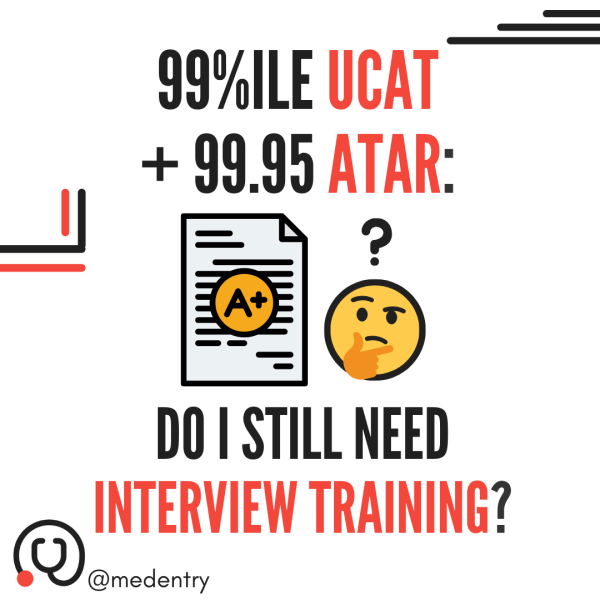I Am Expecting a High ATAR and I Scored Highly in UCAT – Do I Still Need Interview Training?

4 months ago by Rob
This is a common question asked by MedEntry students. Such students, having used MedEntry’s program, have scored highly in UCAT. In addition, many expect to receive a very high ATAR. These students may feel that a place in medical school is guaranteed, so they wonder: 'Why bother with interview training?'
Here is a question we received recently from a student: ‘I expect an ATAR of 99.85+ and I achieved a UCAT percentile of 99. So do I still need interview training?’
The answer is: Congratulations, but definitely, yes!
There are several reasons for this, including:
1. Interviews are very different from UCAT and ATAR
The skills required to succeed in interviews are completely different to the skills required to succeed in ATAR, and UCAT. Interviews test your ability to speak eloquently while thinking on your feet, exude confidence and passion, deliver insightful and considered responses under pressure and engage with interviewers from diverse backgrounds.
2. Interviews are very important
When making the final selection for medicine, interviews are weighted from 25% to 100% of the admissions criteria! Yes, you read that correctly. At some universities, once you have achieved a threshold ATAR and UCAT score, the final decision regarding whether or not you will be admitted into the medical program is based entirely on your interview performance.
By attending interview training, the probability of getting into medical school will increase, from say, 90% to 99%. While you can never be 100% certain of anything in life, for all high stakes situations, it is worth striving to do everything possible to maximise the probability of getting what you are seeking.
3. Interviews are subjective
Even if you receive interviews for every medical school in Australia and attend them all, there is no guarantee that you will gain a place in medicine.
4. You don't know the competition this year
The cut-off scores required for medicine can vary from year to year. This can happen for various reasons such as a higher proportion of students applying for medicine or a greater number of high performing students seeking a place at your preferred university. The medical school place you thought was in the bag, may not turn out to be.
5. You may win a scholarship
You may win a scholarship if you perform as brilliantly in the third and final (interview) component. Many universities offer scholarships to the top few students who achieve a high 'Selection Rank' (or 'Entry Rank'). The 'Selection Rank' is generally obtained by combining the scores from the three admission components (UCAT, ATAR, Interview score). A scholarship not only helps financially, but is great for your CV. Over the last two decades years, many past MedEntry students have won scholarships which helped them get into their preferred specialty.
6. It is always good to aim for a higher 'Selection Rank'
Universities may use your 'Selection Rank' for various allocations (for example, which campus you will study at or which hospital you will be posted to). Students with a higher 'Selection Rank' are more likely to get their preferred choice.
So aim to be the 'crème de la crème' and ensure you are well prepared for interviews!


